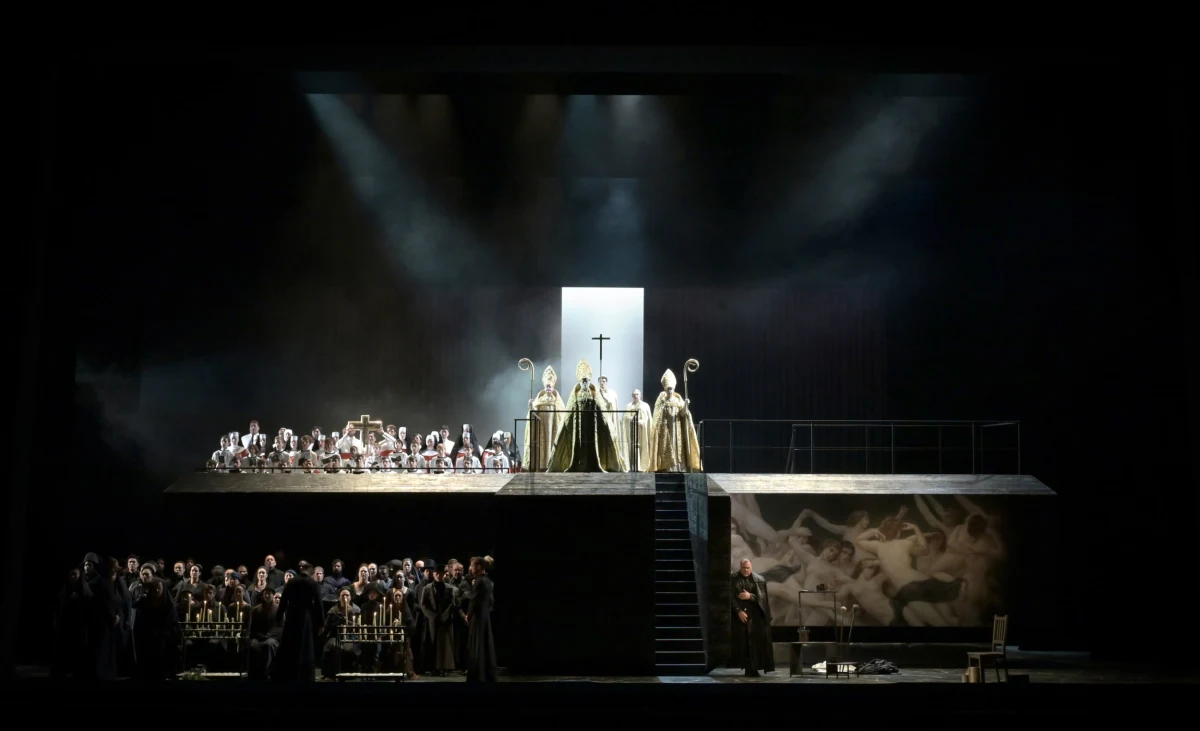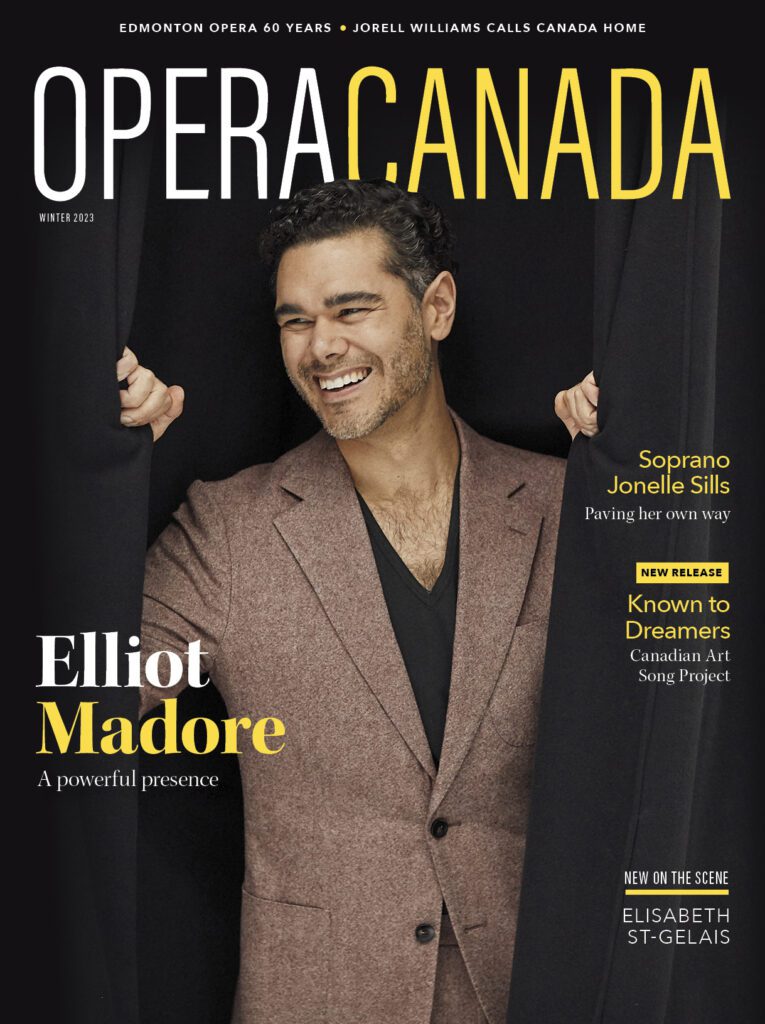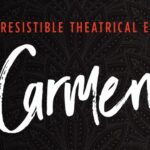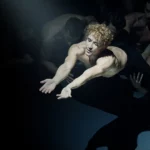Pierre Audi‘s production of Tosca, which premiered in 2014, has become a staple of the Paris Opera repertoire; and rightly so, it’s a classic beauty. Puccini made his lyric tragedy site and time specific, and Audi respects this. We are in Rome in 1800 during the Napoleonic Wars; the brief Roman republic founded two years earlier by Bonaparte has collapsed, and Rome is under the reign of King Ferdinand IV of Naples; the chief of police, Baron Scarpia, rules with terror from the heights of the Palazzo Farnese and the artist Mario Cavaradossi finishes a commission in the Renaissance basilica Sant’Andrea Della Valle. Audi uses the vast Bastille stage to the fullest to replicate these famous landmarks and the result is stunning. The other key to success is that Audi simply tells the story, which has it all: suspense, betrayal, murder, lust, passion, and romance. And while doing so, denounces dictatorship, injustice, torture, and corruption
In Puccini’s day, the work was seen as a thinly veiled criticism of Luigi Gerolamo Pelloux‘s authoritarian and militarist regime, which fell on 24 June 1900, just a few months after the première of Tosca in Rome. But unlike Verdi, Puccini’s true political leanings remain unclear. It’s widely known that he requested a meeting with Mussolini in 1923, for example, just months after the Fascist “March on Rome.” In light of this, it seems unlikely that he was a fervent republican.
Be that as it may, there is no doubt that the work is a universal plea for justice, and many directors seize the opportunity to make contemporary parallels. But Audi sticks to the script and respects its original 1800 setting. He also has superb singers who respond well to his sensitive direction; the result is a production that is coherent in its dramaturgy, atmosphere, and style.
Canadian baritone Gerald Finley, taking over from the Welshman Bryn Terfel, has a less powerful voice, but makes up for it with magnificent tone and varied nuance, endowing his character with more interiority and complexity than I’ve ever seen in this role. For the same reasons, his Hans Sachs in Die Meistersinger, also at the Bastille, remains unforgettable.
Russian soprano Elena Stikhina gives a stunning performance as Tosca, a role she’s sung in Europe, England, and at the Metropolitan Opera with repeated success. She is one of a younger generation of sopranos who take on roles traditionally attributed to bigger, heavier voices but who sing so passionately and with such beauty and precision that they are highly effective. The number of major dramatic heroines on her repertoire list is awe-inspiring, from Elektra to Lady Macbeth to Brunnhilde. The only obstacle to this extraordinary career, which is obviously not an obstacle, is that her diction is so languid that it hardly matters which language she is singing in.
Joseph Calleja‘s Cavaradossi is very old school, hand on heart, and up on the tiptoes to reach for the high notes. But the Maltese tenor puts on a good show, and the audience love him, especially in “E lucevan le stelle,” which garnered riotous applause.
The young Serbian bass, Sava Vermić, sings the role of Angelotti with ardor and impressive volume.
Canadian tenor Michael Colvin and French Baritone Philippe Rouillon are appropriately menacing as Scarpia’s henchmen, Spoletta and Sciarorone.
Though it would have interested me to hear Gustavo Dudamel in this repertoire, the Chilean Paolo Bortolameolli, who is conducting the second run, has a consummate grasp of the verismo style. Firstly, he entices gorgeous tones from the players, bringing out infinite details and colors. The doubling of key vocal lines by the strings in the orchestra is done with extreme finesse. Rather than covering the singers, this unison of the orchestra and voice heightens the drama, but it requires a delicate balance, and he achieves this brilliantly. In stark contrast, the prelude to Act III is austere and stirring, and together with the forlorn jailer’s song (Christian Rodrigue Moungoungou), it prepares the tragic conclusion.
Related content ⬇
Opera Canada depends on the generous contributions of its supporters to bring readers outstanding, in-depth coverage of opera in Canada and beyond. Please consider subscribing or donating today.
PARIS OPERA
SEPT 3 – NOV 26, 2022
*REVIEWED ON NOV 8, 2022
PUCCINI TOSCA
CAST AND CREATIVE TEAMS
Conductor Paolo Bortolameolli
Direction Pierre Audi
Stage Design Christof Hetzer
Costumes Robby Duiveman
Lighting Jean Kalman
Cesare Angelotti Sava Vermić
Il Sagrestano Renato Girolami
Spoletta Michael Colvin
Sciarorone Philippe Rouillon
Choir master Alessandro Di Stefano
Orchestre and Choir of the Paris Opera
Children’s Chorus Maîtrise des Hauts-de-Seine
Floria Tosca Elena Stikhina
Mario Cavaradossi Joseph Calleja
Barone Scarpia Gerald Finley
Cesare Angelotti Sava Vermić
Il Sagrestano Renato Girolami
Spoletta Michael Colvin









